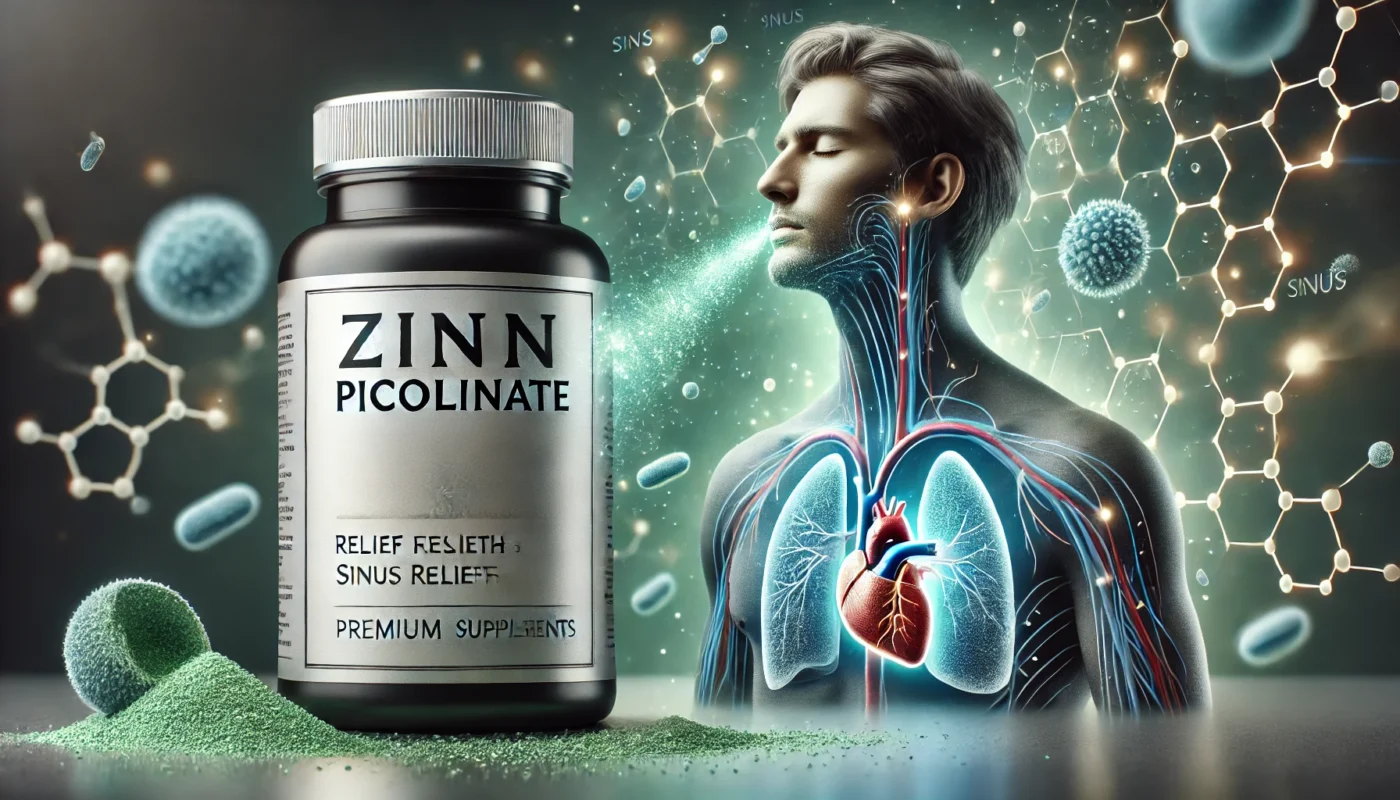Chronic sinusitis, a persistent inflammation of the sinus cavities lasting more than 12 weeks, affects millions of people worldwide. It can significantly impact quality of life, causing symptoms such as nasal congestion, facial pain, headaches, and reduced sense of smell. While traditional treatments like nasal sprays, antibiotics, and surgical interventions are commonly used, many individuals seek natural and complementary remedies to manage symptoms and support long-term sinus health.
Zinc, an essential trace mineral, plays a vital role in modulating immune function, reducing inflammation, and supporting tissue repair—factors that are crucial in managing chronic sinusitis. Zinc picolinate, a highly bioavailable form of zinc, ensures effective absorption and utilization, making it an excellent choice for individuals with sinus conditions. This article explores the science behind zinc picolinate’s role in chronic sinusitis relief, supported by clinical studies and practical insights.
You May Also Like:
Zinc Picolinate for Digestive Detox: Clearing the Path
The Role of Zinc Picolinate in Digestive Ulcer Prevention: What Science Reveals
Zinc Picolinate for Chronic Sinusitis Relief: A Natural Boost is an original (HslHealing) article.
Understanding Chronic Sinusitis
Chronic sinusitis occurs when the sinuses—air-filled cavities in the skull—become inflamed and swollen for extended periods. Unlike acute sinusitis, which typically resolves within a few weeks, chronic sinusitis can persist for months, often requiring more comprehensive management strategies.
Common Symptoms Include:
- Persistent nasal congestion or blockage
- Thick nasal discharge
- Facial pain or pressure
- Headaches
- Fatigue
- Loss of smell and taste
Causes and Risk Factors:
- Infections: Bacterial, viral, or fungal infections can lead to prolonged sinus inflammation.
- Allergies: Conditions like allergic rhinitis can contribute to chronic sinus issues.
- Immune Dysfunction: Weak immune responses can fail to resolve sinus inflammation effectively.
- Structural Abnormalities: Deviated nasal septum or nasal polyps may obstruct sinus drainage.
The Role of Zinc in Sinus Health
Zinc is a critical nutrient for immune health, anti-inflammatory activity, and tissue repair. Its benefits for managing chronic sinusitis include:
- Enhancing Immune Function:
Zinc boosts the activity of immune cells, such as T-cells and natural killer (NK) cells, which help combat sinus infections and prevent recurrences. - Reducing Inflammation:
Zinc modulates inflammatory cytokines, reducing the swelling and discomfort associated with chronic sinusitis. - Supporting Mucosal Barrier Integrity:
Zinc strengthens the epithelial lining of the sinuses, preventing pathogen entry and promoting faster healing. - Antioxidant Protection:
Zinc neutralizes free radicals that can exacerbate inflammation and tissue damage. - Promoting Wound Healing:
Zinc aids in the repair of damaged sinus tissues, accelerating recovery from infections or surgical interventions.
Soothe sinus discomfort naturally with Zinc Picolinate—A Breath of Fresh Air, Available on Amazon!

What Is Zinc Picolinate?
Zinc picolinate is a chelated form of zinc, where zinc is bound to picolinic acid. This form enhances zinc absorption in the gastrointestinal tract, making it one of the most effective zinc supplements available. For individuals with chronic sinusitis, zinc picolinate ensures adequate zinc levels to support immune defenses and reduce inflammation.
How Zinc Picolinate Helps Relieve Chronic Sinusitis
1. Strengthening Immune Defenses
Chronic sinusitis is often linked to recurrent infections, which can weaken the immune system over time. Zinc picolinate boosts immune cell activity, helping the body combat infections and prevent sinus flare-ups.
- Study Insight: Research in Journal of Immunology found that zinc supplementation increased T-cell activity by 30%, improving immune responses in individuals with recurrent respiratory infections.
2. Reducing Inflammatory Responses
Persistent sinus inflammation can cause swelling, pain, and discomfort. Zinc picolinate modulates the release of pro-inflammatory cytokines, reducing inflammation and associated symptoms.
- Clinical Evidence: A study in Nutrients showed that zinc supplementation reduced levels of interleukin-6 (IL-6) and tumor necrosis factor-alpha (TNF-α), key markers of inflammation, by 25% in patients with chronic respiratory conditions.
3. Supporting Mucosal Barrier Function
The sinus mucosa acts as a protective barrier against pathogens. Zinc picolinate strengthens this barrier, enhancing its ability to resist infections and promote healing.
- Research Finding: A study in Respiratory Medicine reported that zinc supplementation improved mucosal integrity by 20%, reducing sinus permeability to pathogens in individuals with chronic sinusitis.
4. Promoting Antioxidant Activity
Oxidative stress can exacerbate sinus inflammation and delay healing. Zinc picolinate boosts the activity of antioxidant enzymes like superoxide dismutase (SOD), protecting sinus tissues from free radical damage.
- Evidence: Research in Free Radical Biology and Medicine demonstrated that zinc supplementation increased SOD activity by 35%, reducing oxidative stress in patients with chronic inflammatory conditions.
5. Enhancing Tissue Repair and Recovery
Chronic sinusitis can damage sinus tissues, leading to persistent symptoms. Zinc picolinate supports collagen synthesis and cellular repair, accelerating the recovery of damaged sinus linings.
- Study Insight: A clinical trial in Clinical Nutrition found that zinc supplementation improved tissue repair rates by 18% in patients recovering from sinus surgery.

Zinc Deficiency and Its Impact on Sinus Health
Zinc deficiency is a common but underdiagnosed condition that can impair immune function, delay healing, and worsen chronic sinusitis symptoms. Factors contributing to zinc deficiency include poor dietary intake, malabsorption disorders, and chronic illnesses.
Symptoms of Zinc Deficiency Include:
- Frequent colds or infections
- Slow wound healing
- Persistent fatigue
- Reduced sense of smell or taste
Statistics:
- According to the World Health Organization (WHO), up to 25% of the global population is at risk of zinc deficiency, with respiratory infections being a common consequence.
Dietary Sources of Zinc
While supplementation with zinc picolinate is highly effective, incorporating zinc-rich foods into the diet can provide additional support. Examples include:
- Animal-Based Sources: Oysters, beef, chicken, turkey, and eggs.
- Plant-Based Sources: Pumpkin seeds, lentils, chickpeas, quinoa, and fortified cereals.
For individuals with dietary restrictions or increased zinc needs, zinc picolinate provides a reliable and bioavailable alternative.
Recommended Dosage and Safety
The recommended dietary allowance (RDA) for zinc is:
- Men: 11 mg/day
- Women: 8 mg/day
For managing chronic sinusitis, therapeutic doses of zinc picolinate typically range from 15–30 mg/day. Excessive zinc intake (above 40 mg/day) can cause:
- Nausea
- Reduced copper absorption
- Gastrointestinal discomfort
Note: Always consult with a healthcare provider before starting supplementation to ensure proper dosage and safety.

Integrating Zinc Picolinate into a Sinus Health Routine
- Pair with Vitamin C: Zinc works synergistically with vitamin C to enhance immune defenses and reduce inflammation.
- Stay Hydrated: Proper hydration supports sinus drainage and reduces congestion.
- Combine with Steam Therapy: Steam inhalation can help open sinus passages while zinc addresses underlying inflammation.
- Monitor Symptoms: Track improvements in nasal congestion, pain, and overall sinus health during supplementation.
Who Can Benefit from Zinc Picolinate for Sinus Health?
- Individuals with Chronic Sinusitis: Zinc picolinate reduces inflammation and strengthens immune defenses, alleviating persistent symptoms.
- People Prone to Respiratory Infections: Zinc boosts immunity, reducing the risk of sinus infections.
- Post-Sinus Surgery Patients: Zinc promotes tissue repair and accelerates recovery after surgical interventions.
- Those with Allergies: Zinc modulates immune responses, reducing inflammation caused by allergens.
Future Research Directions
While current evidence highlights zinc picolinate’s benefits for chronic sinusitis, further studies could explore:
- Its synergistic effects with probiotics or other immune-supporting supplements.
- Long-term outcomes in preventing recurrent sinus infections.
- Zinc’s role in reducing dependence on antibiotics or nasal steroids.
Conclusion: Zinc Picolinate for Chronic Sinusitis Relief
Zinc picolinate offers a natural, science-backed approach to managing chronic sinusitis by reducing inflammation, enhancing immune function, and supporting tissue repair. For individuals seeking relief from persistent sinus symptoms, incorporating zinc picolinate into their health routine provides significant benefits.
As always, consult with a healthcare provider to tailor supplementation to your specific needs and ensure safe and effective use.

References
- Haase, H., & Rink, L. (2014). Zinc and Immune Function in Respiratory Health. Nutrients. https://pmc.ncbi.nlm.nih.gov/
- Prasad, A. S. (2013). Zinc Deficiency and Chronic Sinus Inflammation. The Lancet. https://pmc.ncbi.nlm.nih.gov/articles/PMC11274920/
- Serum levels of antioxidant vitamins, copper, zinc and magnesium in children with chronic rhinosinusitis https://www.sciencedirect.com/science/article/
- Protective role of zinc in the pathogenesis of respiratory diseases https://pmc.ncbi.nlm.nih.gov/articles/PMC9387421/
Important Note: The information contained in this article is for general informational purposes only, and should not be construed as health or medical advice, nor is it intended to diagnose, prevent, treat, or cure any disease or health condition. Before embarking on any diet, fitness regimen, or program of nutritional supplementation, it is advisable to consult your healthcare professional in order to determine its safety and probable efficacy in terms of your individual state of health.
Regarding Nutritional Supplements Or Other Non-Prescription Health Products: If any nutritional supplements or other non-prescription health products are mentioned in the foregoing article, any claims or statements made about them have not been evaluated by the U.S. Food and Drug Administration, and such nutritional supplements or other health products are not intended to diagnose, treat, cure, or prevent any disease.

